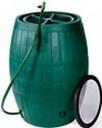Nothing tops pure, clean, rainwater for irrigating the vegetable garden, and I’ve had one of those fancy rain barrels used for collecting runoff water from rooftops on my wish list for a while now.
I always thought they would be great for conserving water and to collect a handy supply of fresh distilled water to use in my bog garden, but Kevin just sent an email which raised an issue with collecting runoff in rain barrels that I hadn’t considered:
Concerns over the Safety of Using Runoff Water
“Kenny, I thoroughly enjoy the bi-monthly newsletter. I have a question for you regarding this month’s feature on watering the vegetable garden. I’m thinking about catching rainwater from the downspouts on the house in a barrel and using it for watering.”
“Nothing special here – standard asphalt shingles and aluminum gutters… is there anything that the asphalt shingles give up to the water as a contaminant that would be detrimental to the vegetable garden?”
Think Before You Drink
Well, I would have normally dismissed any danger of using runoff water, especially if the shingles had been on the roof for any length of time. But a recent article over at NCMG addressing the potential dangers of drinking from garden hoses that contained lead, made me think twice about the possible risk of using roof runoff to water an edible garden.
Asphalt shingles and aluminum, hmmm… I definitely wouldn’t consider drinking that water! But could the runoff water contain harmful elements or chemicals that are leached from the roof and pose a hazard to plant life, or even be capable of contaminating garden soil and crops grown for food?
Using Rain Barrels to Collect Roof Water Runoff
A little research revealed that rainwater runoff is being increasingly collected and stored in various locales and reused, mainly as irrigation water. The Rain Barrel Guide website does warn against using runoff from old tar roofs and those covered with asbestos or treated cedar shingles, but other than that there doesn’t appear to be much concern regarding harmful contamination.
The other cautions associated with storing water in rain barrels include taking absolute care to use only covered and secured containers to eliminate the risk of drowning for children and animals. You should also take precautions to ensure that your rain barrels do not turn into breeding grounds for mosquitoes.
Sources for Rain Barrels and Garden Irrigation Supplies
If you’re in the market for a custom Rain Barrel, Gardener’s Supply Company carries a variety of units that are designed with every feature imaginable to make it a breeze to collect and dole out your stored rainfall runoff.
 These quality rain barrels connect directly to your downspouts, include overflow controls, a hose to dispense the water, and can even be linked together to increase your water storage capacity. Sounds like a good idea to me that will help conserve water resources and promote a healthy garden.
These quality rain barrels connect directly to your downspouts, include overflow controls, a hose to dispense the water, and can even be linked together to increase your water storage capacity. Sounds like a good idea to me that will help conserve water resources and promote a healthy garden.



4 Responses
I’ve been considering this for a while, but I had always wondered about contamination from roof runoff. Thanks for clarifying. I’ve heard there are also barrels out there with filters (maybe from Mother Earth News? I can’t remember..) that would further remove any contamination from roofing shingles and downspouts.
I’ve been studying on rainbarrels and most folks seem to feel that the soil would filter out any contaminants from standard roofing. I recently blogged photos of a friends’ water catch system in Fayetteville, AR. It’s at http://www.larrapin.blogspot.com under “Susana’s Garden Tour.”
There’s a fabulous book by Brad Lancaster called “Rainwater Harvesting for Drylands (Vol. 1): Guiding Principles to Welcome Rain into Your Life And Landscape .” I have volume One (two more to come I hear). He tells the wonderful story of learning water catch from an African farmer in a dry country who used the Bible as his gardening manual! It’s a great read and nice illustrations.
.” I have volume One (two more to come I hear). He tells the wonderful story of learning water catch from an African farmer in a dry country who used the Bible as his gardening manual! It’s a great read and nice illustrations.
Leigh,
Wow, now THAT’S “old school” gardening there! I’ll have to check the book out. It sounds quite interesting!
Emma
Leigh, thanks for the link to the blog with the runoff water catching system and for sharing the information about the rainwater harvesting book. I noticed that Amazon now has volume two of “Rainwater Harvesting for Drylands (Vol. 2): Water-harvesting Earthworks ” available for pre-order. Volume one sounds interesting and received great reviews so I think I will order it, thanks for the recommendation!
” available for pre-order. Volume one sounds interesting and received great reviews so I think I will order it, thanks for the recommendation!